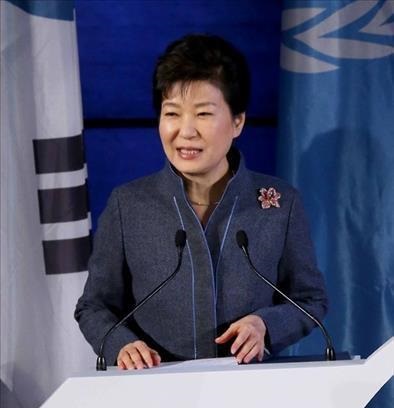- California Assembly OKs highest minimum wage in nation
- S. Korea unveils first graphic cigarette warnings
- US joins with South Korea, Japan in bid to deter North Korea
- LPGA golfer Chun In-gee finally back in action
- S. Korea won’t be top seed in final World Cup qualification round
- US men’s soccer misses 2nd straight Olympics
- US back on track in qualifying with 4-0 win over Guatemala
- High-intensity workout injuries spawn cottage industry
- CDC expands range of Zika mosquitoes into parts of Northeast
- Who knew? ‘The Walking Dead’ is helping families connect
S. Korea donates $11 million to African countries for job training

South Korean President Park Geun-hye makes a speech at UNESCO headquarters on Dec. 1, 2015 during her visit to Paris. (Yonhap)
PARIS (Yonhap) — President Park Geun-hye pledged Tuesday to provide more than US$11 million to 10 African countries over the next five years for vocational training, calling education a solution to ending violent extremism and “an integral ingredient” to economic success.
South Korea has helped five African countries — Malawi, Zambia, Botswana, Namibia and the Democratic Republic of the Congo — in developing and distributing textbooks under the $10-million project since 2011. The project is set to end in 2016.
South Korea plans to add five new African countries for a second phase of the project with a budget of about $11.8 million. There is no word yet on which countries will be the new recipients.
“Poverty, the lack of jobs for the young and social marginalization of the vulnerable, among others, are creating hotbeds of discord and conflict,” Park said in a speech at UNESCO in Paris. “Against this backdrop, Korea will more actively scale up its contributions to international efforts to deal with such challenges facing humanity.”
Separately, South Korea plans to start a $6-million UNESCO funds-in-trust program to help Rwanda, Mozambique and Zimbabwe innovate education over a three year period beginning this year.
Seoul’s aid represents a sea of change for South Korea over the past decades. In 1951, the U.N. culture agency set up a textbook factory in South Korea to help print school textbooks and formulated a plan for rebuilding education.
She also said education could help sow in the minds of children in conflict zones the seeds of reconciliation over hatred, dialogue over violence and hope over despair.
“The answer lies in none other than education,” Park said, noting addressing social and economic root causes that feed terrorism is critical to ending violent extremism.
She also vowed to take active part in international endeavors to combat terrorism.
On Monday, she visited the site of the deadly terror attack in Paris after attending the U.N. climate change summit, in a symbolic gesture that underscored South Korea’s solidarity with France.
Park laid white chrysanthemums in front of the Bataclan Theater and paid silent tribute to those who were killed in the attack on Nov. 13.
Park also said South Korea will collaborate on education to make a better world, saying the case of South Korea shows that education offers “the surest and most sustainable foundation for fostering peace and prosperity.”
South Korea’s education fervor helped transform the country into Asia’s fourth-largest economy from the ashes of the 1950-53 Korean War.
U.N. Secretary-General Ban Ki-moon, a former South Korean foreign minister, has said that education was the key to South Korea becoming the first former aid recipient to join the ranks of official donors in a half-century.
UNESCO chief Irina Bokova also said South Korea’s enthusiasm for education made it possible for Seoul to become an aid donor and it should share its experiences with other countries.
Touching on inter-Korean issues, Park held out the prospect of greater inter-Korean exchange and cooperation if South and North Korea build trust and restore a sense of shared identity through sustained cultural exchanges.
Despite political ups and downs, the two Koreas have been cooperating in preserving the ruins of Manwoldae, the royal palace of the Goryeo Dynasty that ruled the Korean Peninsula from 918 to 1392.
South Korea believes that cultural cooperation could help restore a sense of common identity between the two Koreas, which have been divided for decades.
The Korean Peninsula was divided into the capitalistic South and the communist North after its liberation from Japan’s 1910-45 colonial rule. The 1950-53 Korean War ended with a cease-fire agreement, not a peace treaty, leaving the two Koreas technically still at war.
Also Tuesday, Park observed the signing of a deal with the U.N. culture agency on setting up a center in South Korea that is designed to conduct research and educate others on South Korea’s traditional martial arts.
Park later left for Prague for a summit with regional leaders.
















Pingback: World African Martial Arts Conference | blackbelt - martialartspro
Pingback: Mozambique Martial Arts | teach - brazilian jiu jitsu
Pingback: Korean Word For Taekwondo | pro - martialartspro
Pingback: Traditional Martial Arts Of South Korea | title here
Pingback: South Korea Taekwondo Training | bicycle - body camera